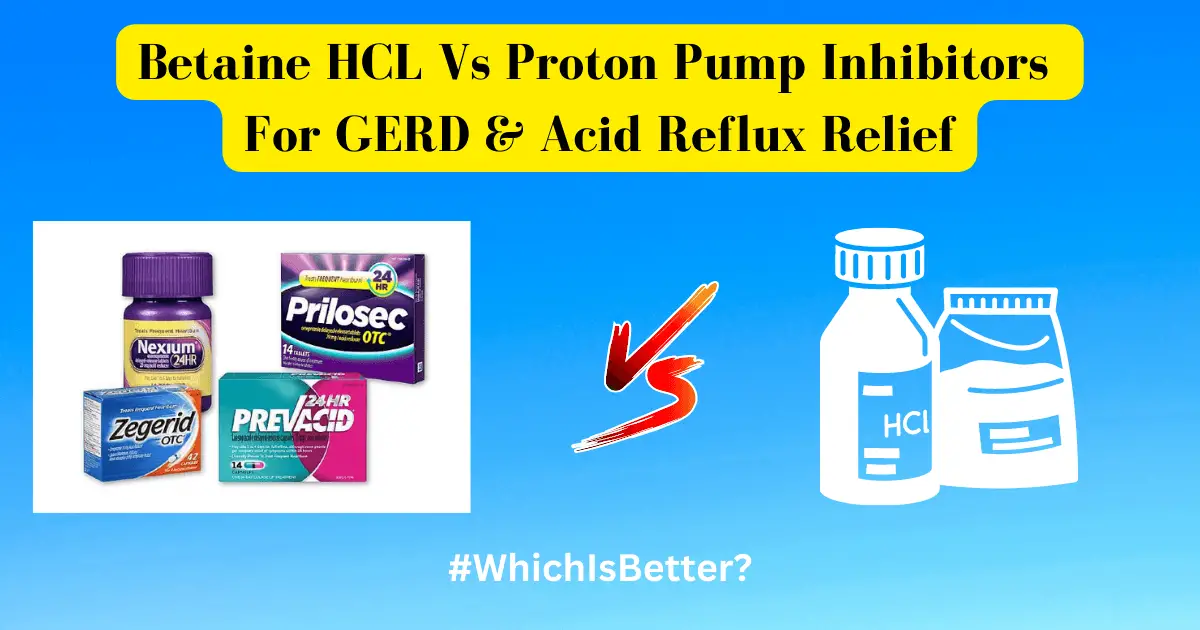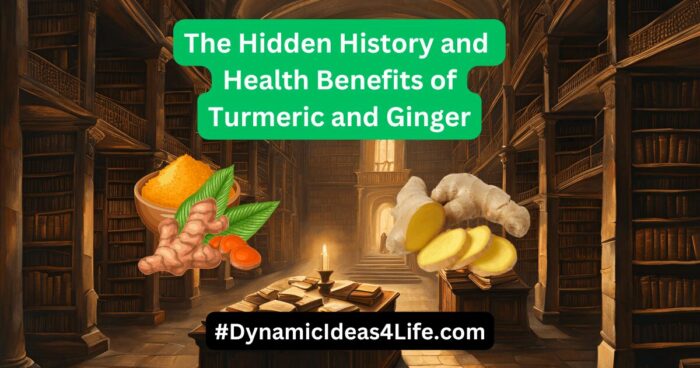When it comes to GERD (Gastro-Esophagal-Reflux-Disease) the usual treatment given to most people will be PPIs (Proton Pump Inhibitors) such as Omeprazole and other similar medications.
However, as an alternative Betaine HCL vs PPIs for GERD is a very interesting approach for those that understand what really might be happening in their Esophagus.
The Esophagus for those unaware is a part of the body just above the stomach and its natural role is to allow for the safe passage of food from the mouth (and throat) to the stomach.
It may also act as a passageway to expel fluid from the stomach such as vomit.
The mechanism of the Esophagus is solely to open and close to allow material in and out at the right times and this includes stomach acid. This is done via a valve called the Lower Esophagus Spincheter (LES). When this doesn’t close this can lead to stomach acid being brought up into the esophagus causing what is known as heartburn.
Acid Reflux or in more extreme cases GERD is what happens when this valve doesn’t open and close as it usually should. One reason why one might decide to look into taking either PPIs or Betaine HCL for relief.
I will discuss both in today’s post and let you decide which of the two you think is better. So…
Betaine HCL vs PPIs for GERD: Which Is the Better Treatment?

Mostly the thing here to understand about GERD, acid reflux, and heartburn is that the real cause is not always as straightforward as many might think. Usually, it is thought that too much stomach acid is responsible for these ailments but in fact, this is not actually always true.
The key here really is understanding both of these treatments and how they act inside the body.
Especially Betaine HCL which I will begin by discussing in the next section below…
So What Are Betaine HCL Supplements?
Betaine HCL is a natural supplement that helps improve digestion by increasing stomach acid levels. It contains a combination of betaine and hydrochloric acid (HCL) which work together to break down food in the stomach.
Betaine HCL supplements are commonly used by those who suffer from digestive issues like acid reflux, heartburn, and GERD in a similar way to PPIs. However, the difference is that whilst many people rely on proton pump inhibitors (PPIs) to reduce stomach acid Betaine HCL instead increases it.
This might seem odd to your average GERD sufferer – For those who don’t know they might think – why would anyone want to increase stomach acid? The usual thought that most people with acid reflux will have is that they have too much stomach acid. So why would they want more?
But actually, why Betaine HCL might work better for those with GERD is that it may not be too much stomach acid that is causing this at all. It may be caused by built-up pressure against the stomach pushing acid back up into the esophagus.
It kind of gets a bit complicated here but stomach acid does a number of things other than just digestion. Its natural role in human biology includes signaling the pancreas to produce digestive enzymes and it also signals the LES (Lower Esophagul Spincter) to open and close) at the right times.
Low acid (Hypochlorhydria) can in fact be the real culprit and here is what many might like to know.
Does Betaine HCL Really Work Better Than PPIs?
When it comes to managing GERD symptoms, both Betaine HCL and PPIs are often recommended. However, many people wonder whether one option works better than the other.
It is a good question, but it is of course important to note that both Betaine HCL and PPIs work in quite different ways. PPIs work by blocking the production of stomach acid, whilst Betaine HCL actually helps to increase stomach acid levels. So they are basically the opposites of each other.
Except when comparing the two it should be noted that there is limited research on the effectiveness of Betaine HCL specifically for GERD. Some studies suggest that it may be helpful in improving digestion which is beneficial for reducing reflux symptoms but still more research is really needed.
One study published in the Journal of Clinical Gastroenterology found that participants who took Betaine HCL with meals experienced a significant decrease in GERD compared to those who took a placebo. [R]
Additionally, Betaine HCL may be particularly beneficial for people who have low stomach acid levels. This can be common in older adults and those with certain medical conditions.
In these cases, taking a PPI of any kind may actually exacerbate symptoms by further reducing stomach acid levels. So, the bottom line is that while PPIs can be effective for managing GERD symptoms, they do come with potential side effects, such as increased risk for bone fractures, infections, and nutrient deficiencies.
Betaine HCL supplements, on the other hand, are generally considered safe when taken as directed.
Benefits of Betaine HCL Over PPIs
Really it is not right to say PPIs are all bad. PPIs can definitely be very effective for treating GERD. Although the thing to understand is that Betaine HCL offers some unique benefits that PPIs cannot match.
They first of all work quickly and efficiently to increase stomach acid levels, while PPIs can take days or even weeks to take effect. This means that individuals experiencing immediate discomfort or symptoms of GERD can benefit from the fast-acting properties of Betaine HCL.
Secondly, PPIs can cause long-term negative effects on the body, such as reduced nutrient absorption and increased risk of bone fractures. Betaine HCL, on the other hand, has not been linked to any major side effects or health concerns.
Thirdly, Betaine HCL is a more natural solution to treating GERD, whereas PPIs are synthetic drugs that can potentially have harmful effects on the body.
Betaine HCL supplements are derived from natural sources and work to restore balance to the digestive system in a gentle and holistic way, and not just this but Betaine HCL supplements are typically less expensive than PPIs, making them a more affordable option for individuals seeking treatment for GERD.
However, this definitely should go without saying, before taking either Betaine HCL or Proton Pump Inhibitors as a potential treatment for GERD keep in mind that you should always speak to a trained professional first.
Possible Side Effects Of Taking Betaine HCL
The most important thing to note about Betaine HCL is that it can NOT be taken alongside NSAIDS (Non-Steroidal Anti Inflammatories) or corticosteroids. This can damage the stomach lining and cause ulcers and bleeding.
Betaine HCL should only be taken for a short time because you can end up producing too much stomach acid.
Although, PPIs are not really much better in this respect because lowering the stomach acid too much can cause similar issues. Exactly why really you should first try and determine your stomach acidity levels.
Also, before looking to try Betaine HCL you should consider its effects on Natural Pepsin Production. This is really the key to everything because Pepsin is an enzyme that aids in the digestion of proteins. It is essential for the production of stomach acid but if you are taking Pepsin in supplement form this signals your body to start producing less.
For any vegans also this is produced from animal by-products so this is another problem but if you shop around you can get pepsin-free Betaine HCL Supplements.
Some say that you need pepsin in these supplements to work effectively but really this is not completely true.
Choosing Which Betaine HCL Supplements To Buy
For anyone looking to try Betaine HCL, there is quite a list to choose from. Our pick we will share shortly but in case you are curious here are some of the different products to take a look at.
1. Thorne Betaine HCL & Pepsin: This supplement contains a blend of Betaine HCL and Pepsin. Thorne Research is known for its quality supplements. It is formulated to support optimal digestion and is free from gluten, dairy, soy, and GMOs.
2. NOW Foods Betaine HCL: This supplement provides 648mg of betaine hydrochloride per capsule, along with 150mg of pepsin. It is vegetarian-friendly and contains no gluten, dairy, or soy.
3. Solgar Betaine HCL with Pepsin: This supplement offers 1000mg of betaine hydrochloride and 200mg of pepsin per tablet. It is vegan-friendly, gluten-free, and contains no artificial colors, flavors, or preservatives.
4. Pure Encapsulations Betaine HCL: This supplement provides 520mg of betaine hydrochloride per capsule and is free from gluten, dairy, and soy. It is also suitable for vegans as this is unlike the other Pepsin-Free.
5. Garden of Life Dr. Formulated Betaine HCL: This supplement is formulated by a board-certified neurologist and offers 600mg of betaine hydrochloride per capsule. It also contains organic ginger root to support digestion.
*This supplement is also pepsin-free.
From this list, the last 2 would be what we recommend because they are pepsin-free although another that we think is better than all 5 of these supplements is as follows…
Our Pick: Bioptimizers HCL Breakthrough – Pepsin Free – Vegan-Friendly Betaine HCL Supplement
When it comes to choosing the right Betaine HCL supplement, Bioptimizers HCL Breakthrough stands out as our top pick. This product is specially formulated to support healthy digestion and address issues related to low stomach acid levels.
Here’s why we recommend Bioptimizers HCL Breakthrough:
- High-Quality Ingredients: HCL Breakthrough is made with premium-quality ingredients that are carefully selected for their effectiveness and purity. Each capsule contains a potent blend of betaine HCl, with digestive enzymes that work synergistically to enhance digestion and nutrient absorption.
- Optimal Dosage: The dosage of Betaine HCl in HCL Breakthrough is optimized to provide effective support for individuals with low stomach acid levels. The capsules are conveniently dosed to ensure you get the right amount of Betaine HCL to address your digestive concerns without overwhelming your system.
- Enhanced Digestive Function: HCL Breakthrough not only helps to increase stomach acid levels but also provides additional digestive enzymes. These enzymes assist in the breakdown of proteins, fats, and carbohydrates, promoting optimal digestion and reducing the risk of undigested food causing digestive discomfort.
- Quality Assurance: Bioptimizers prioritize the highest standards of quality and safety in their products. HCL Breakthrough undergoes rigorous testing to ensure that it meets strict quality control standards. This commitment to quality gives you confidence in the product’s reliability and effectiveness.
- Positive Customer Feedback: HCL Breakthrough has garnered positive reviews from many satisfied customers. Users have reported improved digestion, reduced bloating, and relief from symptoms associated with low stomach acid. The positive feedback highlights the product’s effectiveness and customer satisfaction.
- Money-Back Guarantee: Bioptimizers offer a 365-day money-back guarantee on their products, including HCL Breakthrough. This generous guarantee allows you to try the product risk-free and ensures your satisfaction with the results. (Note: this is only for one bottle for new customers)
In summary, Bioptimizers HCL Breakthrough is our top pick for a Betaine HCl supplement. It is not only pepsin-free, and vegan friendly but Its high-quality ingredients, optimal dosage, and comprehensive digestive support make it an excellent choice for individuals seeking relief from low stomach acid and related digestive issues.
In Conclusion
Both Betaine HCl and PPIs have their uses in managing digestive issues, but of course, they work in different ways. Betaine HCl can be beneficial for individuals with low stomach acid levels, while PPIs are commonly used to reduce excessive acid production.
Before choosing between the two, it is important to identify the underlying cause of your digestive issues and consult with a healthcare professional to determine the most appropriate course of action.
Remember, personalized advice from a qualified healthcare provider is crucial in making the best decision for your individual needs. Knowing if you have too much or not enough stomach acid is really the key here.
Taking a test is sensible because many who think they have too much stomach acid actually don’t have enough. If this is the case you don’t want to be taking PPIs because it will only deplete your stomach acid even more. Same as if you have excessive stomach acid levels you don’t want to take Betaine HCL.
You can buy tests to help determine this but really what can not be stressed enough is you should talk to a GP. Knowing whether you have too much or not enough stomach acid should be the key to finding relief.
Health Disclaimer:
The information provided in this article is for educational purposes only and should not be considered a substitute for professional medical advice, diagnosis, or treatment.
Always seek the advice of your physician or qualified healthcare provider with any questions you may have regarding a medical condition.
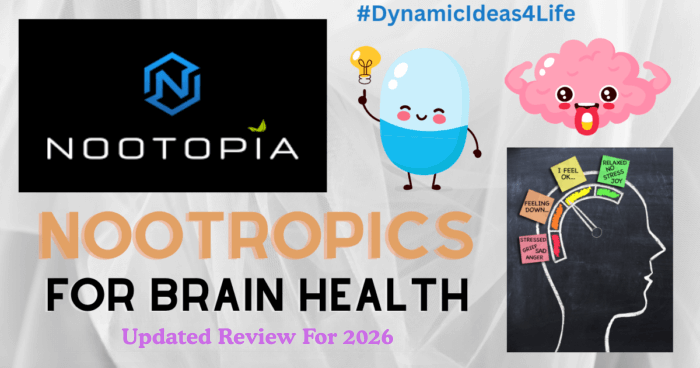
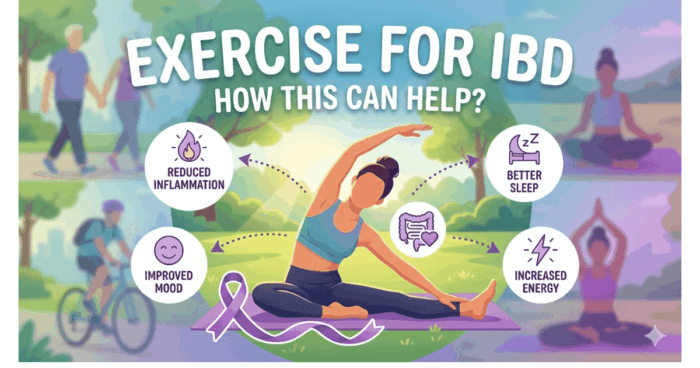


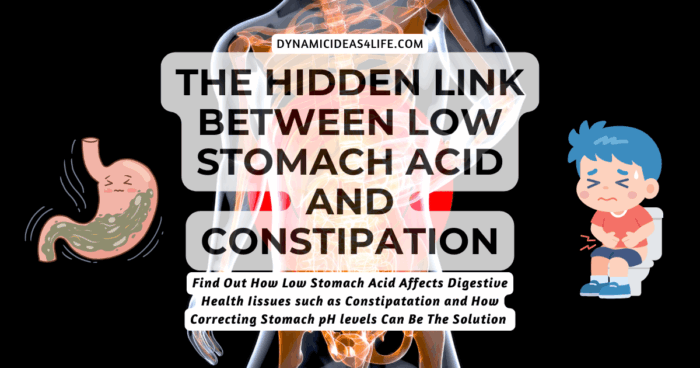

Anxiety and Depression are you magnesium deficient best ways to lower blood sugar BiOptimizers blood pressure supplements blood sugar support supplements Digestive Enzymes Supplement digital products Dr Sam Robbins Exercise Gut Health Healthy Living heart health HFL how to lower blood sugar levels How To Lower Cholesterol how to make the immune system stronger insulin resistance joint health supplement Keto keto dieting Keto Diet Weight Loss leaky gut supplements leptin resistance list Magnesium deficiency Matt Gallant mental health multivitamins Nootropics nutrient supplements Probiotics Probiotic Supplements proteolytic enzymes reverse type 2 diabetes stress and anxiety stress relief vitabalance vitapost Wade Lightheart weight loss articles weight loss diet plans weight loss product reviews weight loss supplements weight loss tea

